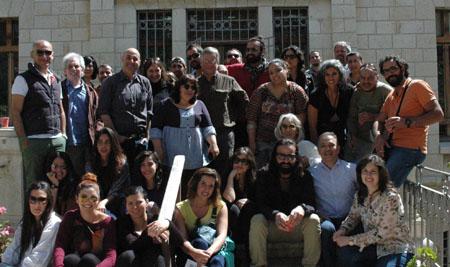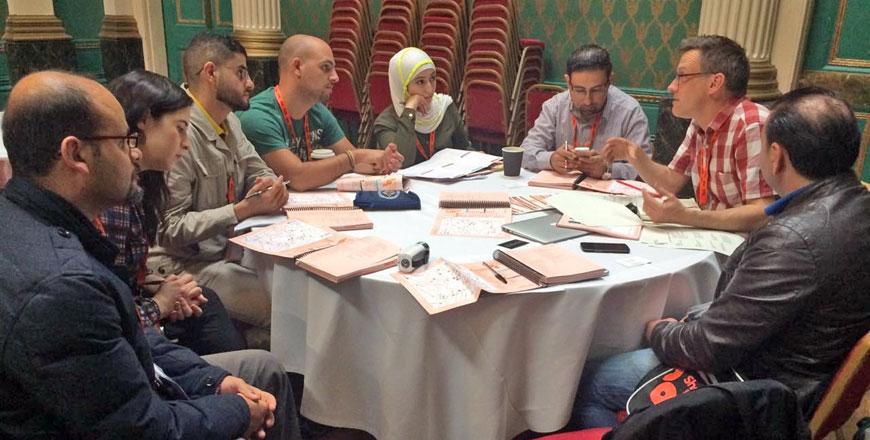You are here
Crowdfunding campaign looks to sustain Med Film Factory
By Rand Dalgamouni - Feb 02,2015 - Last updated at Feb 02,2015

AMMAN — Eager to continue enabling Arab filmmakers to tell the stories they want the world to know, the Royal Film Commission (RFC) has resorted to crowdfunding to keep one of its major programmes alive.
The RFC has launched a campaign on crowdfunding website Indiegogo, reaching out to sector insiders and average audiences alike to finance its Med Film Factory training programme after the funding period for it through the EU’s Euromed Audiovisual III Programme concluded in 2014.
“Filmmaking is a very vibrant and energetic industry, so we thought — especially since most people involved in filmmaking are IT literate and always networking — we can use this method to raise funds,” said Zaid Shaker, Jordan Film Fund manager at RFC, who is involved in the campaign.
After three cycles (2011-2014) that benefited around 50 producers and directors, many of whom have gone on to release features to great acclaim, the RFC is hoping that some of the film factory’s alumni will pitch in to keep it going.
“It’s one of the best ways to let previous participants give back to a project they believe in and have been part of. They know it’s a successful programme,” noted Deema Azar, the RFC’s Rawi Screenwriters’ Lab manager, who is also involved in the crowdfunding process.
The funding for the Med Film Factory, through the EU, officially ended in December 2014.
“With no alternatives secured for 2015, we resorted to crowdfunding to keep the flame burning. The Med Film Factory is not dead, though the funding has stopped. We are going to do everything to try and revive it,” Azar told The Jordan Times in a recent interview.
“We have other options, but crowdfunding is a good way to start because it’s widely accessible and it also brings attention to the problem of funding,” she said, noting that more than one source is needed to support the initiative.
The other options, according to Shaker, include search for sponsorships from production houses, NGOs or film enthusiasts, in addition to applying for grants.
“We have to knock an all doors to revive this important programme,” he added.
When it comes to crowdfunding, “there is the financial contribution and there is word of mouth,” said Shaker, who noted that the campaign targets filmmakers — individuals and production houses — and the general audience.
“If you can’t financially contribute, you can contribute by sharing the link of the campaign on your Facebook page. At the end of the day it’s all about networking.”
With a target of $75,500, the campaign, which started on January 14 and concludes on March 15, has so far collected $1,000 (www.indiegogo.com/projects/med-film-factory-training-program#home).
Contributors are offered “perks” based on the amount they contribute, ranging from a mention on the project’s website or Facebook page, to a credit roll on films produced through the project, being cast as an extra or receiving executive producer credit.
The Euromed Audiovisual Programme had originally financed the project during 2011-2013, but the RFC requested an extension of the implementation period until mid-2014, according to Azar.
“We basically delivered nine workshops in this period and they were all huge. Three were directors’ workshops, in which participants shot scenes from their projects,” she noted.
Initiated by the RFC, Sud Ecriture from Tunisia and the Huston School of Film & Digital Media from Ireland, the Med Film Factory — in each cycle — extended over three interrelated stages: a producers’ coaching programme, a directors’ workshop and an “Independent Film Assembly”.
Professionals and veterans of the film industry supervise and mentor participants to develop their creative skills and support them in the materialisation of their projects.
The programme also seeks “to contribute to the creation of collective connections within the Arab regional film industry” to encourage regional support, involvement and financing of “independent creative voices and films”.
This, in turn, will sustain the overall Mediterranean film industry, according to the project’s website (www.medfilmfactory.com/).
In the factory’s last cycle, in April 2014, two scenes shot as short films during the directors’ workshop “proved to be more than just a successful exercise”. They were selected to the 25th Carthage Film Festival’s official short film competition, which took place between November 29 and December 6, 2014, Azar noted.
The films are “Shake” by Jordanian Director Deema Dabis and “With Predetermination” by Ahmad “Tarzan” and Mohammad “Arab” Abo Nasser from Palestine, inspired by their feature film project titled “The Script is Ready.”
“We reached an impressive stage of maturity in the programme … only for the plug to be pulled on the funding,” Azar said.
Out of the 24 feature film projects that went through the programme, two have been shot and are now in post-production. Eight more are now in pre-production, she noted.
“Although this may only be a training opportunity, the output is yielding an impressive product. I hope this shows people that this is a programme worthy of their support.”
Success stories
Projects by Med Film Factory participants between 2011 and 2014:
•”Condom Lead”: a short Palestinian fiction film by Ahmad Abo Nasser and Mohammad Abo Nasser, produced by Rashid Abdelhamid. It was selected as the first Palestinian entry to the Official Short Film Competition of the 66th Festival de Cannes 2013, France. It was also screened at the Sao Paolo International Short Film Festival 2013, Brazil, and the Short Film Competition — Warsaw Film Festival 2013 in Poland.
• “My Love Awaits by the Sea”: a documentary by Mais Darwazeh (Palestine/Jordan) produced by Rula Nasser from Jordan. The film was officially selected for several film festivals in 2013 and 2014 including the 38th Toronto International Film Festival and the 10th Dubai International Film Festival. It received the best documentary award at the Ismaliyyeh Film Festival 2014.
• “Troubled Waters”: a short fiction film by Toufic Khreich, produced by Lara Ayoub from Lebanon, which had its world premiere at the 10th Dubai International Film Festival where it competed in the Muhr Arab Short competition and won the Jury’s Certificate of Appreciation in recognition of Camille Salameh’s outstanding performance in the lead role. The film also won the Best Short Film Award at the fourth Malmo Arab Film Festival in 2014.
• “Dry Hot Summers”: a short fiction film by Sherif El Bendary from Egypt that received the Robert Bosch Foundation co-production award for short feature film, amounting to 60,000 euros. The film was shot in Cairo in October 2014 and is now in post-production.
• “Get Married”: a short fiction film by Ismahane Lahmar from Tunisia. It received a special jury mention at the fourth Malmo Arab Film Festival in 2014.
Source: RFC
Related Articles
AMMAN — The Abdul Hameed Shoman Foundation (AHSF) and the Royal Film Commission–Jordan (RFC) on Wednesday signed an agreement supporting the
AMMAN — The Royal Film Commission (RFC) and Abdul Hameed Shoman Foundation (AHSF) on Wednesday signed, for the second consecutive year, an a
AMMAN — Jordanian filmmakers are participating in film festivals in the UK, the Royal Film Commission (RFC) said in a statement on Sunday.Th













